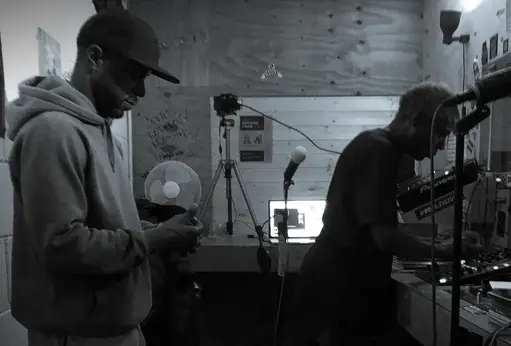
14 November 2021
Music as Spectral Infrastructure: Day Two
Day two as part of the two day program Music as Spectral Infrastructure, part of Le Guess Who? 2021, considers the sound system as a form of spectral infrastructure, and how anti-colonial resistance to racial capitalism was channeled through sound system music such as dub, house, techno, and jungle.
Program day two
13.00–13.15 hrs
Introduction
Louis Moreno (member of freethought and lecturer in the Department of Visual Cultures, Goldsmiths, University of London, London)
13.15–14.30 hrs
Black Audio Film Collective (Reece Auguiste), Twilight City, 1989, 60 min.
Film screening
The day begins with a screening of Black Audio Film Collective’s 1989 film Twilight City, which presents the financial deregulation and spatial restructuring of London in the late 1980s as a global shift in the economies of social domination that began at the colonial plantations of the Caribbean. The film presents a woman’s letter to her mother in Dominica, accompanied by interviews with historians, theorists, and journalists that reveal London as a city undergoing a global financial transformation where people live in worlds separated by race, gender, and class. Twilight City is a profound meditation on London, exile, queerness, abandonment, and on the racial violence unleashed by the Margaret Thatcher government.
After the film, a conversation between Lynnée Denise and Edward George reflects on Black electronic music’s extraordinary capacity to articulate an infrastructure of feeling in resistance to the racial and sexual regimes that reproduce capitalism.
14.30–15.15 hrs
Turntable Epistemologies
Lynnée Denise (artist, scholar, writer, and DJ)
Presentation and conversation with music excerpts
In this session, Lynnée Denise discusses her research into sound system culture during the rollout of neoliberalism in the 1980s, focusing on how one can think about sound system culture as a mode of survival for Black queers and migrants under assault from Thatcherism and Reaganism. The conversation reflects on how the contemporary understanding of neoliberalism as a racially and sexually oppressive regime is due to the cultural work of sound system producers and dancers.
15.15–16.00 hrs
The Strangeness of Dub
Edward George (writer and researcher)
Presentation and conversation with music excerpts
Edward George’s radio show The Strangeness of Dub combines critical theory, social history, a cross-genre musical selection, and live dub mixing to explore dub’s dimensions, spaces, and influences. This session focuses on The Strangeness of Dub and the themes of the Black Audio Film Collective’s film Twilight City (1989). George’s research articulates how dub is, as George says, a “marginal music and a music of margins, first and most enduringly located on the ‘b side’.” This conversation revolves around how dub queers our sense of what an infrastructure can do.
16.00–16.15 hrs
Break
16.15–18.00 hrs
Turntable Methodologies and Sound of Music
Listening Sessions
As a culmination of the two-day program, Lynnée Denise and Edward George play tracks and music that manifest the strangeness and wonder of sound system culture.
Turntable Methodologies Listening Session
Lynnée Denise (artist, scholar, writer, and DJ)
Sound of Music Listening Session
Edward George (writer and researcher)
Introduction
Louis Moreno (member of freethought and lecturer in the Department of Visual Cultures, Goldsmiths, University of London, London)
13.15–14.30 hrs
Black Audio Film Collective (Reece Auguiste), Twilight City, 1989, 60 min.
Film screening
The day begins with a screening of Black Audio Film Collective’s 1989 film Twilight City, which presents the financial deregulation and spatial restructuring of London in the late 1980s as a global shift in the economies of social domination that began at the colonial plantations of the Caribbean. The film presents a woman’s letter to her mother in Dominica, accompanied by interviews with historians, theorists, and journalists that reveal London as a city undergoing a global financial transformation where people live in worlds separated by race, gender, and class. Twilight City is a profound meditation on London, exile, queerness, abandonment, and on the racial violence unleashed by the Margaret Thatcher government.
After the film, a conversation between Lynnée Denise and Edward George reflects on Black electronic music’s extraordinary capacity to articulate an infrastructure of feeling in resistance to the racial and sexual regimes that reproduce capitalism.
14.30–15.15 hrs
Turntable Epistemologies
Lynnée Denise (artist, scholar, writer, and DJ)
Presentation and conversation with music excerpts
In this session, Lynnée Denise discusses her research into sound system culture during the rollout of neoliberalism in the 1980s, focusing on how one can think about sound system culture as a mode of survival for Black queers and migrants under assault from Thatcherism and Reaganism. The conversation reflects on how the contemporary understanding of neoliberalism as a racially and sexually oppressive regime is due to the cultural work of sound system producers and dancers.
15.15–16.00 hrs
The Strangeness of Dub
Edward George (writer and researcher)
Presentation and conversation with music excerpts
Edward George’s radio show The Strangeness of Dub combines critical theory, social history, a cross-genre musical selection, and live dub mixing to explore dub’s dimensions, spaces, and influences. This session focuses on The Strangeness of Dub and the themes of the Black Audio Film Collective’s film Twilight City (1989). George’s research articulates how dub is, as George says, a “marginal music and a music of margins, first and most enduringly located on the ‘b side’.” This conversation revolves around how dub queers our sense of what an infrastructure can do.
16.00–16.15 hrs
Break
16.15–18.00 hrs
Turntable Methodologies and Sound of Music
Listening Sessions
As a culmination of the two-day program, Lynnée Denise and Edward George play tracks and music that manifest the strangeness and wonder of sound system culture.
Turntable Methodologies Listening Session
Lynnée Denise (artist, scholar, writer, and DJ)
Sound of Music Listening Session
Edward George (writer and researcher)
Music as Spectral Infrastructure Music as Spectral Infrastructure: Day TwoMusic as Spectral Infrastructure: Day One